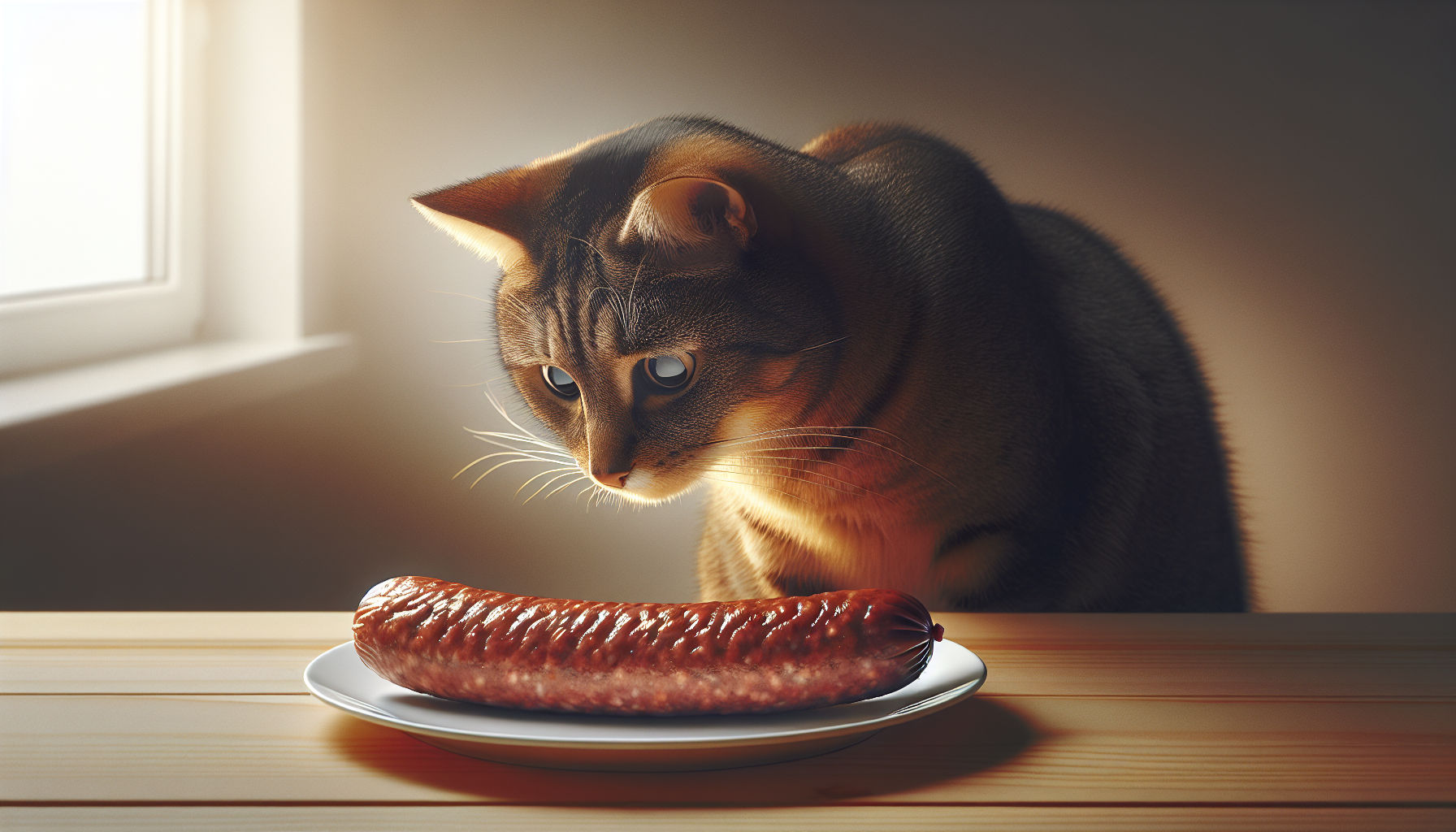Have you ever wondered if cats can enjoy a delicious sausage treat? Sausage is a popular food among humans, but when it comes to our feline friends, we must be cautious about what they consume. In this article, we will explore whether cats can safely eat sausage or if it poses any potential risks to their health. So, if you’ve been curious about treating your furry companion to a sausage snack, keep reading to find out all the important details.
Can Cats Eat Sausage
If you’re a cat owner, you may find yourself wondering if it’s safe to share a bite of your sausage with your feline friend. After all, cats are known for their curious nature and desire to try new foods. But before you toss a piece of sausage their way, it’s important to understand the potential risks and benefits involved.
Types of Sausage
Before we delve into whether cats can eat sausage or not, it’s essential to understand the different types of sausages that exist. Sausages come in various forms, each with its own preparation and ingredients.
Processed Sausages
Processed sausages, such as hot dogs, are made by finely grinding meat and adding various fillers, seasonings, and preservatives. These sausages usually contain a mixture of meats, including pork, beef, and chicken.
Raw Sausages
Raw sausages, like some types of salami or chorizo, are cured and aged meats that often contain a combination of pork, beef, or other meats. These sausages are typically consumed without cooking.
Cooked Sausages
Cooked sausages, like bratwurst or breakfast sausage, undergo a cooking process to ensure they are safe for consumption. The ingredients in cooked sausages can vary, but they often contain a mixture of meats, seasonings, and preservatives.

This image is property of images.unsplash.com.
Nutritional Value of Sausage
To determine if cats can eat sausage, it’s essential to assess its nutritional value. Here are a few key components to consider:
Protein Content
Sausage generally contains a significant amount of protein. This macronutrient is essential for cats as it aids in muscle development and overall growth. However, cats have unique protein requirements, and their primary source should come from animal-based protein rather than heavily processed meats.
Fat Content
Sausages tend to have a high fat content, which can be problematic for cats. While cats need a certain amount of fat in their diet, too much can lead to weight gain, obesity, and even gastrointestinal issues.
Salt Content
Another concern when it comes to sausage is its salt content. Cats have a low tolerance for sodium, and excessive salt intake can lead to dehydration, kidney problems, and even heart issues. It’s crucial to monitor the sodium levels in your cat’s diet.
Additives and Preservatives
Many sausages contain additives and preservatives to enhance flavor and prolong shelf life. While these components may be safe for human consumption, cats’ digestive systems may not be able to handle them as efficiently. It’s best to avoid feeding sausages containing these additives to your feline friend.
Risk of Feeding Sausage to Cats
Feeding sausage to your cat poses several risks that you should carefully consider before offering them a taste.
Digestive Issues
Cats have sensitive digestive systems, and foods that are high in fat and processed can cause discomfort and digestive distress. Feeding sausages to your cat may result in digestive issues such as vomiting, diarrhea, or constipation.
High Fat Content
As mentioned earlier, sausages tend to have a high-fat content. While small amounts of fat are necessary for your cat’s well-being, excessive fat consumption can lead to obesity and related health problems.
Sodium Intake
Sausages often contain a significant amount of salt, which can be harmful to cats. Excessive sodium intake can lead to dehydration and hypertension. It’s crucial to control the amount of salt your cat consumes.
Food Allergies
Some cats may have food allergies or sensitivities to certain ingredients commonly found in sausages, such as pork or beef. Feeding your cat sausages may trigger an allergic reaction, leading to skin rashes, digestive issues, and even respiratory problems.
Additive and Preservative Sensitivity
The additives and preservatives commonly used in sausages can also cause adverse reactions in cats. Cats may have difficulty metabolizing these chemicals, leading to gastrointestinal upset, allergic reactions, or other health issues.

This image is property of images.unsplash.com.
Alternatives to Feeding Sausage to Cats
While feeding sausage to your cat may not be the best idea, there are several safe and healthy alternatives you can consider to satisfy their desire for a tasty treat.
Commercially Prepared Cat Treats
Opt for commercially prepared cat treats that are specifically designed to meet your feline friend’s nutritional needs. These treats are typically formulated with cat-friendly ingredients and come in a wide variety of flavors that your cat is sure to enjoy.
Cooked Lean Meats
If you’re looking to treat your cat to a meaty snack, cooked lean meats can be a safe option. Chicken, turkey, or even small pieces of lean beef can make a delicious and nutritious treat for your feline companion. Just be sure to remove any seasonings, skin, and bones before offering it to your cat.
Fish
Fish can be an excellent alternative to sausages for cats. It provides a good source of protein and essential omega-3 fatty acids, which are beneficial for their overall health. However, be cautious with certain types of fish that may contain high levels of mercury or bones that could pose a choking hazard.
Poultry
Cooked poultry, such as plain chicken or turkey, can be a healthy and flavorful treat for your cat. Make sure the poultry is thoroughly cooked and free from any seasonings or spices that may upset their digestive system.
Safe Ways to Offer Sausage to Cats
If you still want to give your cat a taste of sausage within moderation, here are a few guidelines to follow:
Moderation
While sausages should not be a regular part of your cat’s diet, offering an occasional small piece as a treat may be acceptable. Remember, moderation is key.
Remove Skin and Fat
Before offering any sausage to your cat, ensure you remove the skin and fat. This will help reduce the fat content and minimize the risk of digestive issues.
Cooked and Unseasoned Sausage
If you choose to give your cat a taste of sausage, opt for cooked sausages that are unseasoned. Avoid sausages with additives, preservatives, or high sodium content, as these can be harmful to your cat.
Small Pieces
Cut the sausage into small, bite-sized pieces to minimize the risk of choking and make it easier for your cat to eat and digest.

This image is property of images.unsplash.com.
Signs of Sausage Allergy or Intolerance
Even if you take precautions, your cat may still have an adverse reaction to sausage. Here are a few signs to watch out for:
Vomiting
If your cat vomits after consuming sausage, it may be a sign of an intolerance or food allergy. Monitor their behavior and consult your veterinarian if the vomiting persists or is accompanied by other symptoms.
Diarrhea
Diarrhea is another common symptom of food allergies or intolerances in cats. If your cat experiences loose stools or diarrhea after eating sausage, it’s best to avoid feeding it to them in the future.
Skin Rash
A skin rash or excessive itching may indicate an allergic reaction to sausage. Monitor your cat’s skin for any redness, bumps, or swelling after they consume sausage.
Sneezing
Sneezing or nasal congestion can occur if your cat has an allergic reaction to sausage. It’s best to discontinue feeding them sausage and consult with your veterinarian if these symptoms persist.
What to Do If Your Cat Eats Sausage
If your cat accidentally eats sausage or consumes it without your knowledge, here are steps you can take:
Observe for Symptoms
Keep an eye on your cat for any signs of discomfort or adverse reactions. Monitor them closely for the development of symptoms such as vomiting, diarrhea, or changes in behavior.
Contact Veterinarian
If you notice any concerning symptoms or your cat appears unwell after consuming sausage, contact your veterinarian for guidance. They can provide further advice and recommend appropriate steps to take.
Provide Necessary Information
When contacting your veterinarian, be sure to provide them with detailed information about the type of sausage, ingredients, and any observed symptoms. This information will assist them in making an accurate diagnosis and providing the necessary treatment.

Conclusion
While sausage may be a delicious treat for us humans, it’s best to avoid feeding it to your cat. The high fat content, sodium levels, and potential allergens make it a risky choice for our feline friends. Instead, opt for safe alternatives such as commercially prepared cat treats, cooked lean meats, fish, or poultry. Remember to always prioritize your cat’s health and consult your veterinarian if you have any concerns or questions regarding their diet.

